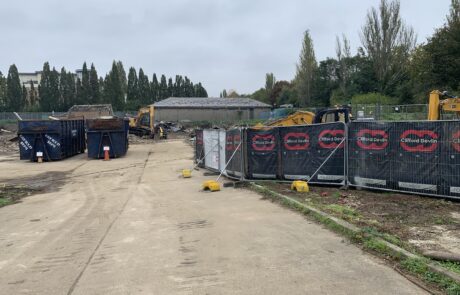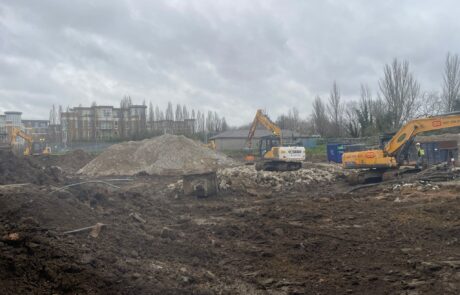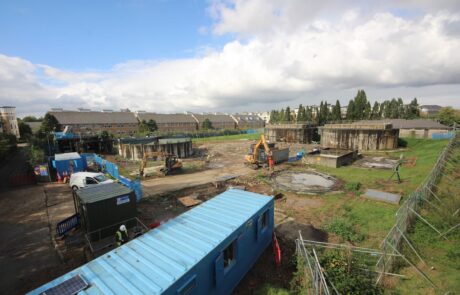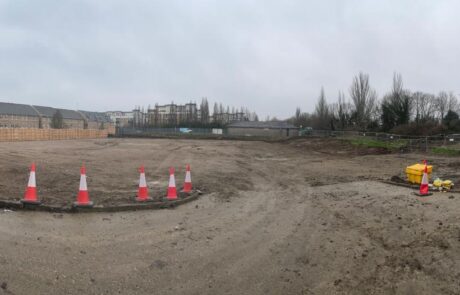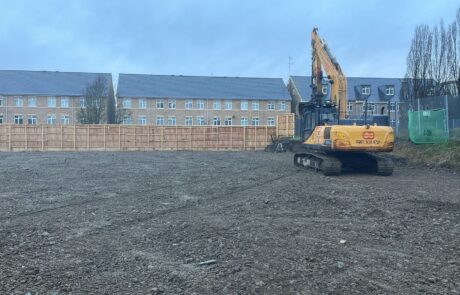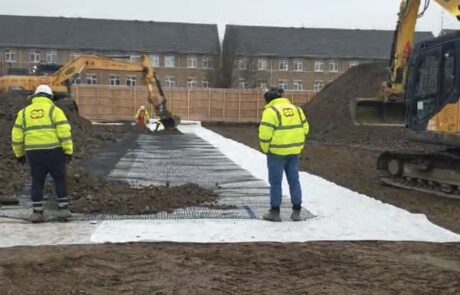Client: Consultancy
Duration: 26 Weeks
Location: West London
Value: Circa £925k
Clifford Devlin were awarded a significant demolition contract in West London by a new client. The project involved the complete demolition and clearance of structures, removal of foundations and over 4000 tonnes of soil, and site preparation for future construction and installation of a TBS base. The team were also responsible for managing debris, recycling materials, and coordinating with third-party service providers for disconnections.
The project began with pre-demolition preparations, including the erection of hoardings to secure the site and the safe removal of any asbestos-containing materials. Service disconnections were arranged by third parties, with electrical supplies terminated by UK Power Networks and gas services disconnected outside the site boundary.
Once the site was secured, demolition commenced. Structures were dismantled down to ground slab level, followed by the removal of foundations and hard standings to a depth of two metres. The team cleared all arising debris and transported it to licensed disposal and recycling facilities. On-site material crushing reduced the need for imported aggregates, promoting sustainability.
The final phase involved groundworks and site preparation. Pile probing was carried out to locate underground obstructions, and piles were identified and marked for future construction. The site was levelled, and a piling mat was installed, along with the construction of a TBS base to support the next phase of development.
During the works, unexpected below-ground obstructions and service positions were encountered. To ensure safety, Explosive Ordnance Disposal Engineers (EODE) were brought in to deliver UXO (Unexploded Ordnance) Safety and Awareness briefings to the workforce and project management team as needed before any intrusive works. They also provided an Operational UXO Emergency Response Plan (ERP).
Additionally, a live water hydrant was discovered on-site and retained for use, reducing the need for external water sources. Electrical and gas disconnections were effectively managed through coordination with third-party providers, ensuring safety and preventing project delays.
To minimise the project’s environmental footprint, we reused all of the concrete on site (900 tonnes) which was crushed and laid for a piling mat. All other arisings were carefully segregated and recycled in line with Clifford Devlin’s commitment to sustainable practices and in line with our carbon reduction plan. This meant that 17.2% of the total waste from site was reused on site and the remaining 82.8% was recycled. We were even able to help our Client uplift some of their BREEAM credit ratings specifically on PO 7.7 – Anti Bribery as well as MCE 4.1 – Construction, demolition and excavation waste.
Throughout the project, the team maintained clear communication with residents. Regular updates were provided, and any concerns were promptly addressed. By adhering to the agreed schedule and minimising disruption, the project was carried out smoothly and with minimal impact on the surrounding community.


